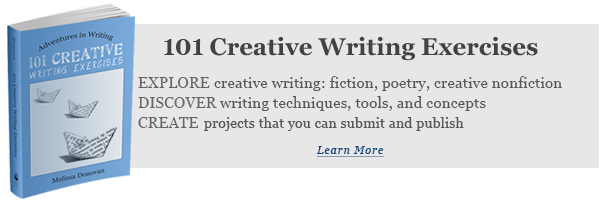Today, I’m sharing an excerpt from my book, 101 Creative Writing Exercises (aff link). It’s packed with writing exercises that are designed to help you explore all forms of creative writing: fiction, poetry, and creative nonfiction. The book will inspire you while imparting useful writing techniques that are fun and practical.
This exercise comes from “Chapter 2: It’s Personal.” The writing exercises in this chapter focus on writing of a personal nature: memoir, journal writing, and personal essays.
I chose this exercise because it’s challenging and fun. It asks you to look at your own life from a fresh perspective and make yourself the subject of a news report.
Give it a try! Then come back and tell us what you learned and how this exercise worked for you.
Report It
Is your life newsworthy? Have you ever witnessed, committed, or been the victim of a crime? Have you ever participated in a protest or a performance? Have you ever had an odd or unusual (paranormal or supernatural) experience?
Traditional and professional journalism is concise and factual. It adheres to a set of journalistic ethics, focusing on the facts and details of the story and presenting those facts thoroughly and honestly. True journalism is objective. The ethical journalist does not inject his or her feelings or opinions.
But journalists are human. The news media in general is increasingly accused of using a variety of creative tactics to spin the news in favor of their own religious, political, or philosophical beliefs. For example, in a report, a journalist should not badmouth a suspected criminal, but that journalist can include a quote from a witness who has badmouthed the criminal while intentionally not including a positive quote from some other witness.
Journalists can pick and choose quotes, facts, and even which stories to report.
When you think about the fact that journalists and reporters are responsible for feeding us information about what’s going on in the world and then consider that they are mere human beings, flawed, emotional, and opinionated just like the rest of us, you can only begin to imagine and wonder just how spun all the news actually is.
The Exercise
Your challenge is to revisit your past and write a news report about something you experienced firsthand.
The rules are simple: straight journalism. What does that mean? True journalists are not allowed to include personal emotion or opinion in their writing. Be as objective as possible. Don’t take sides!
Write about the event or incident as if you are a journalist looking in on your own story from the outside. Make sure you include a headline that will attract readers’ attention.
Tips: To get a feeling for how journalism is written (its tone and style), visit a reputable news site and read a few articles.
Variations: Instead of reporting on a story, write a paparazzi piece. Were you spotted while out on a hot date? If you’re at a loss for subject matter, get creative and write a fictional news story; make up something or change something from your past or better yet, write a news story from your future (maybe you win the Pulitzer Prize in ten years).
Applications: The most obvious application is that you could, someday, become a journalist. Journalism in general is an objective style of writing (at least, it’s supposed to be), and this is a style that is difficult to achieve. This exercise encourages you to write about something you care about but to refrain from including your feelings or personal views.






I am totally stunned by this extracts, it is so funny and good at the same time. But it also very challenging as you’ve said, I’ve tried writing as a journalist but it remains elusive! (it bits me…).
Journalism is a tough nut to crack, that’s for sure.